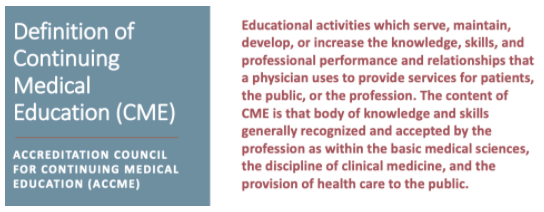

Non-CME educators are allowed to present on any topics or content that the planners or they personally determined to be of value. This is a big reversal in comparison to CME which must encompass only that which would assist the physician in their spectrum of responsibilities to be more effective or more efficient. Keep those last points in mind as that is critical to the underlying value of CME.
However, CME can cover some topics and content outside of common medical processes if and only if these topics are of value in the professional world of physicians and support the improvement of their clinical practices. This can include educational concepts such as…
While this does begin to expand our idea of what CME is in the realm of the medical education, there are still many more topics considered ineligible. So, what’s the Bottom Line?
Activities not directly related to a physician’s professional work does not fall within the ACCME definition of CME content. Although they may be worthwhile for physicians, continuing education activities related to a physician’s nonprofessional educational needs or interests are outside the scope of eligibility. This means, even an award-winning discussion on personal financial planning or the Appreciation of 18th Century British Lit is just not going to cut it as a CME-accredited activity. Next Time on Foresight Chats… Collaborating with New CME Presenters: Difference 2: Identify Learner Practice Gaps and Educational Needs